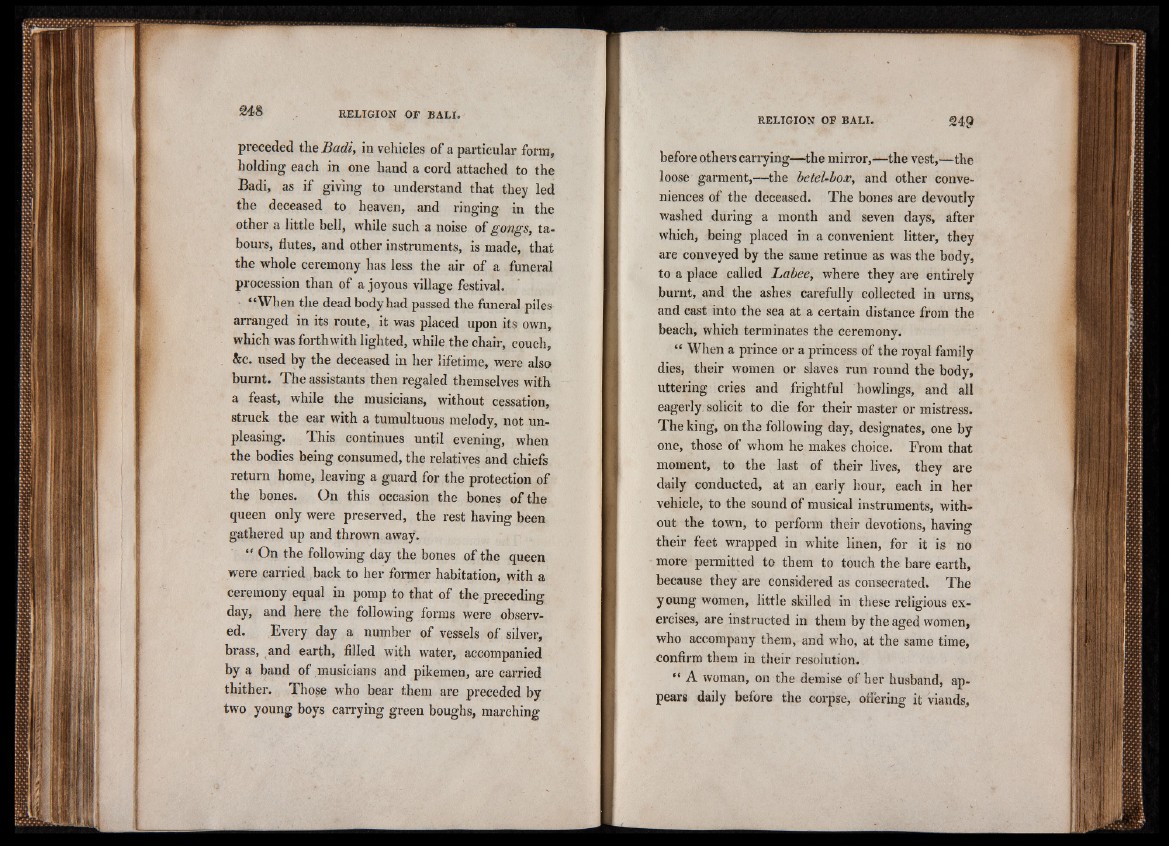
preceded theBadi, in vehicles of a particular form,
holding each in one hand a cord attached to the
Badi, as if giving to understand that they led
the deceased to heaven, and ringing in the
other a little bell, while such a noise of gongs, ta-
bours, flutes, and other instruments, is made, that
the whole ceremony has less the air of a funeral
procession than of a joyous village festival.
“When the dead body had passed the funeral piles
arranged in its route, it was placed upon its own,
which was forthwith lighted, while the chair, couch,
&c. used by the deceased in her lifetime, were also
burnt. The assistants then regaled themselves with
a feast, while the musicians, without cessation,
struck the ear with a tumultuous melody, not un-
pleasing. This continues until evening, when
the bodies being consumed, the relatives and chiefs
return home, leaving a guard for the protection of
the bones. On this occasion the bones of the
queen only were preserved, the rest having been
gathered up and thrown away.
“ On the following day the bones of the queen
were carried back to her former habitation, with a
ceremony equal in pomp to that of the preceding
day, and here the following forms were observed.
Every day a number of vessels of silver,
brass, and earth, filled with water, accompanied
by a band of musicians and pikemen, are carried
thither. Those who bear them are preceded by
two young boys carrying green boughs, marching
before others carrying—the mirror,—the vest,—the
loose garment,—the betel-box, and other conveniences
of the deceased. The bones are devoutly
washed during a month and seven days, after
which, being placed in a convenient litter, they
are conveyed by the same retinue as was the body,
to a place called Labee, where they are entirely
burnt, and the ashes carefully collected in urns,
and cast into the sea at a certain distance from the
beach, which terminates the ceremony.
“ When a prince or a princess of the royal family
dies, their women or slaves run round the body,
uttering cries and frightful howlings, and all
eagerly solicit to die for their master or mistress.
The king, on the following day, designates, one by
one, those of whom he makes choice. From that
moment, to the last of their lives, they are
daily conducted, at an early hour, each in her
vehicle, to the sound of musical instruments, without
the town, to perform their devotions, having
their feet wrapped in white linen, for it is no
more permitted to them to touch the bare earth,
because they are considered as consecrated. The
young women, little skilled in these religious exercises,
are instructed in them by the aged women,
who accompany them, and who, at the same time,
confirm them in their resolution.
A woman, on the demise of her husband, appears
daily before the corpse, offering it viands,